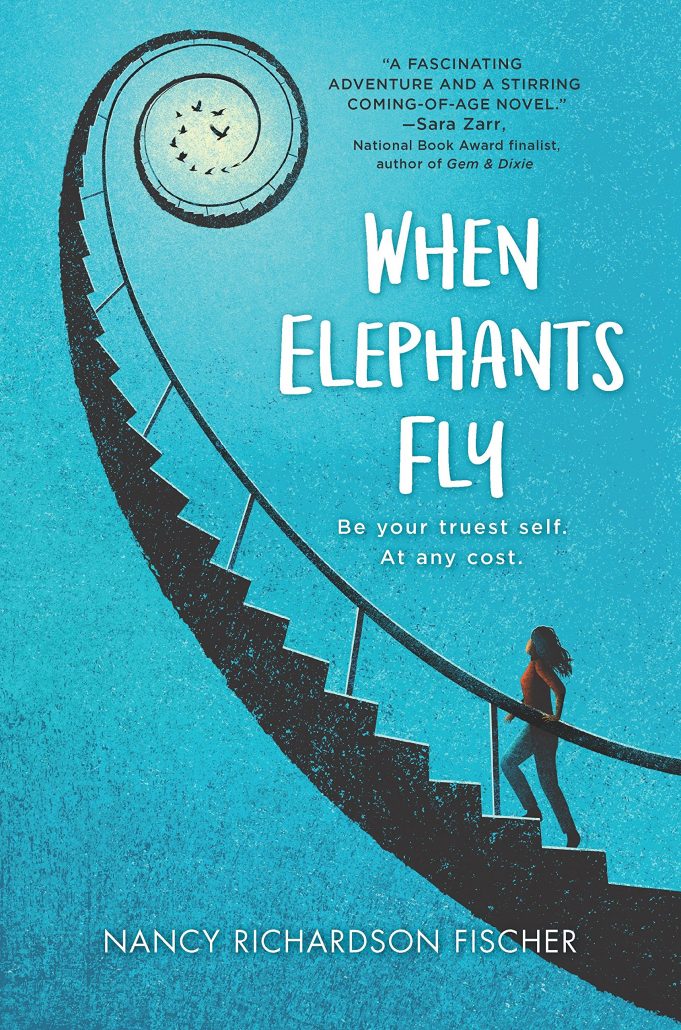At this year’s Book Expo in New York City, authors from all over the world previewed their newest books. One author in particular, Nancy Richardson Fischer, received lots of buzz for her newest young adult book. The new book is called When Elephants Fly, and was just released this month. The book tackles a variety of subjects, from mental illness to the wellbeing of animals. Young Entertainment Mag spoke with Nancy Richardson Fischer about her new book and where her inspiration for the story came from.
Young Entertainment Mag: Tell us a bit about your new novel, “When Elephants Fly”.
Nancy Richardson Fischer: When Elephants Fly revolves around T. Lillian Decker, a high school senior with a twelve-year plan: avoid stress, drugs, alcohol and boyfriends, and take regular psych quizzes administered by her best friend, Sawyer, to make sure she’s not developing schizophrenia.
Genetics are not on Lily’s side. When she was seven, her mother, who had paranoid schizophrenia, tried to kill her. And a secret has revealed that Lily’s odds are even worse than she thought. Still, there’s a chance to avoid triggering the mental health condition, if Lily lives a careful life from ages eighteen to thirty, when schizophrenia most commonly manifests in women.
But when a newspaper internship results in Lily witnessing a mother elephant try to kill her three-week-old calf, Swifty, Lily can’t abandon the story or the calf. With Swifty in danger of dying from grief, Lily must choose whether to risk everything, including her sanity and freedom, on a desperate road trip to save the calf’s life, perhaps finding her own version of freedom along the way.
YEM: What inspired you to write this story?
Nancy: There were two inspirations for When Elephants Fly. First, I have a dear friend, Bea, whose mom has a mental health condition. Bea grew up in a very stressful household with an erratic mother who was in and out of hospitals when her medications needed adjustment. Bea understood from a young age that she had approximately a 10% genetic chance of having some sort of mental health issue. Ten percent is a
huge number when it’s your life! Despite her fears, Bea chose to go to college, pursue a career, marry and have a child. But a lot of people in similar situations become frozen in time, afraid to do something wrong
that might trigger a condition. Bea’s experiences were the launching point for creating When Elephants Fly—a universal story about finding a way to live in the moment (whenever possible) despite real or perceived obstacles or fears, because the moment is all anyone is actually guaranteed.
The second inspiration for When Elephants Fly, and specifically for my elephant calf, Swifty, was my first job working for Ringling Bros. and Barnum & Bailey Circus. I traveled with the show and wrote stories about talented performers—highwire, teeterboard, and trapeze artists who passed their skills down generations and whose athletic feats were incredible. But I also witnessed wild animals in captivity, which was unbearably sad. One day a visitor asked me why all the elephants, shackled by one leg between shows, were swaying. I said what I’d heard other members of the show say: “Because they like the music.” But by the sick feeling in my stomach I knew that wasn’t true. Those elephants were swaying because they were depressed and slowly losing their minds.
A few weeks later, I quit my job and promised myself that beyond donating to animal protection and conservation organizations, I’d find a way to shine a light on the plight of animals in captivity and the wild.
Swifty is my chance to inspire readers to care about elephants and work to save them. There are only about 450,000 African and 40,000 Asian elephants left in the wild. Elephants face likely extinction in the next 20 years. Today I support the work of Space for Giants , an organization battling to secure a safe future for elephants and their landscapes, and Reteti Elephant Sanctuary , a community-owned elephant sanctuary in northern Kenya that rescues and ultimately releases orphaned and abandoned elephant calves back into the wild.
YEM: Was it challenging to write about such heavy topics, such as mental illness, strained relationships and grief?
Nancy: It’s never easy to delve into heavy topics, but it’s fulfilling in the sense that I gained so much understanding and empathy for anyone facing the possibility of, or living with, a mental health condition. While researching When Elephants Fly, I learned that about one-third of homeless persons have serious mental health issues. Each individual living on the street was once like my protagonist, Lily, filled with passion and promise. My hope is that When Elephants Fly will create more understanding and empathy for those struggling to survive their conditions.
YEM: Did you research mental illness when writing this book?
Nancy: Definitely. It was extremely important to me to treat the subject of mental health conditions with respect, and to portray Lily with sensitivity and honesty. I read accounts written by family members that have loved ones with mental health issues, and personal stories of what it’s like to live with different diagnoses. Videos, documentaries and TED talks gave me additional information and context, and conversations with psychiatrists and physicians helped me to understand the myriad medications and options. What surprised me most in my research was the incredible resiliency of the human spirit and the power that hope, love, friends and family have in the lives and prognosis of those living with a mental health condition.
YEM: Did you research the behavior of animals as well?
Nancy: I spent time at my local zoo with the lead veterinarian, who takes care of EVERY animal there! That means birds, mice, cougars, elephants, bears, monkeys … I’m not sure how so much knowledge fits in one brain! I also read about elephants, watched videos of their behaviors and live births, as well as documentaries about daring rescues in the wild. First-hand accounts about how difficult it is to keep an elephant calf alive after she has been rejected by a mother, or orphaned due to poachers, were hard to read but powerful. The most important thing I learned is that elephants are complex, intelligent, loving, loyal beings that experience both joy and grief, and that grief can easily take their lives. The dedicated rescuers and caretakers of elephants, and especially calves, have a heart-rending but vitally important and fulfilling profession.
YEM: What advice would you give to readers that are dealing with mental illness? What would you like them to take away from this book?
Nancy: I’m not a doctor or psychiatrist so I can’t give any specific advice except to say that asking for help if you’re afraid you have a mental health condition is brave. Confide in a parent, friend, or trusted mentor, and please don’t give up. There is always hope.
My personal takeaway from When Elephants Fly is this: We all face obstacles that threaten to stall or derail our lives. Regardless, choose to live in the moment whenever it’s possible and find something or someone to fight for. Loving and helping others is what makes life
fulfilling.





